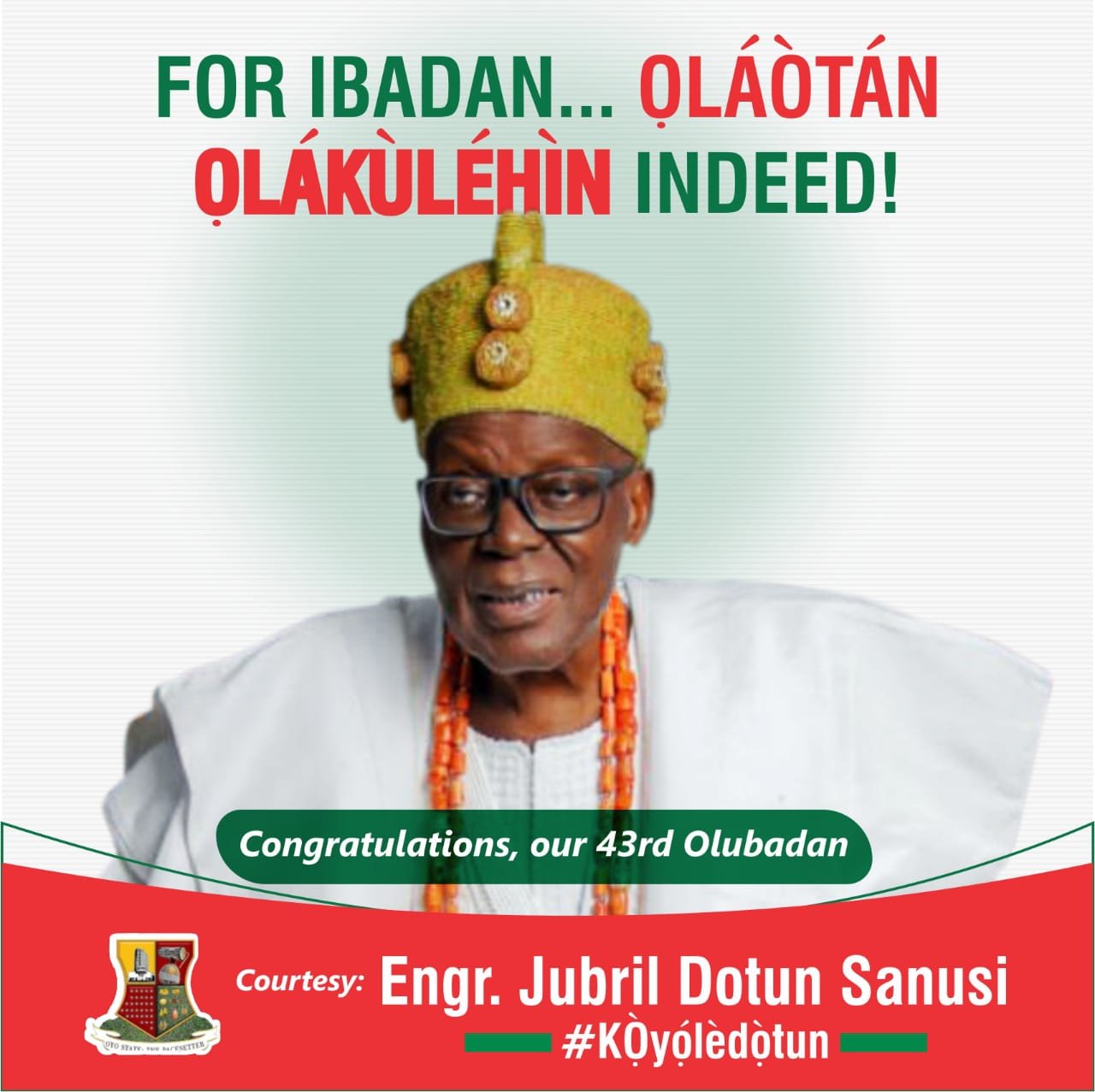Going by banners and posters the city of Ibadan in western Nigeria has to be the most interesting political landscape in the run up to the 2019 gubernatorial election in that nation. The city has always had colourful politicians. There was Adegoke Adelabu of the “Penkelemes” fame in the First Republic. For the uninitiated, “penkelemes” was the phonetically devolution of “peculiar mess” by Adegoke Adelabu, of blessed memory. It’s a reprise of the reputational equity of Ibadan in the field of adaptive linguistics. Such phonetical nativism reminds one of the “Shiboleth” saga in the Bible. The people of Gilead had mandated the pronunciation of that word to distinguish enemy from ally. The Ephraimites from the East could not pronounce “She.” so they pronounced “Shiboleth” as “Seeboleth.” That dialectical provincialism afflicts the people of Ibadan, hence their refrain to the provincial howdy, “Kini show” is “Sow swore” rather than “Show sure.”
To be sure, an Adelabu genetic offshoot is also running for Governor in Ibadan. He has smartly latched on to the acclaimed “Penkelemes” slogan. It’s one of the many colourful branding attempts. One poster reads, “Temitope Sugar for Governor.” One can imagine the candidate entering a political arena and the crowd going, “Shoooogaaah!” His sobriquet is “Sugar” after all. The Ibadan crowd will probably go, “Soooogah!” Another candidate labelled himself “Bugatti Fulfilment 2019.” One wonders what that high performance car brand has anything to do with Ibadan politics. Wonders will never end. A Dr. Azeez Adeduntan proclaimed on his billboard, “International Surgeon for Governor.” Only in Ibadan. Surely the medical profession has no category for “international surgeons.”
One candidate seemed to declare himself, “The Weapon 2019.” It might have been poor messaging. Perhaps he meant getting a voter’s card is the weapon for 2019 election. His billboard is graphically confusing. Then there was the Senior Advocate of Nigeria – SAN. SAN is the equivalent of taking the silk in England. His name is Akintola. He declared himself “competent, cerebral and accessible.” Politicians don’t brand themselves “cerebral” in Nigeria. This is different posturing. Another candidate called Alao – pronounced “allow,” went into rap mode.
His billboard says, “Allow Alao for Governor.” That’s “Eje o se” in local dialect – “Let him do it.” It’s some sort of transliteration and it resonates locally. Another candidate went under the banner “Mission 2019,” and yet another declared “Continuity and Progress.”
If Jesus lived in the colourful city of Ibadan, Nigeria, and he was running for Governor what would his poster read? Now, that’s an interesting thought! Jesus would have been a very peculiar candidate for Governor in Ibadan – very understated and classy. Perhaps he wouldn’t even print any poster, though his supporters might. This is based on Isaiah’s messianic prophecy: “He will not cry out or shout; he will not publicize himself in the streets.” Isaiah 42:2 NET. In other words we will not see any colourful posters from Jesus based on Isaiah 42:2. He will not be a typical Ibadan politician. But he will have serious Godfather backing. This is how Isaiah put that: “Take a good look at my servant. I’m backing him to the hilt. He’s the one I chose, and I couldn’t be more pleased with him. I’ve bathed him with my Spirit, my life. He’ll set everything right among the nations. He won’t call attention to what he does with loud speeches or gaudy parades.” Isaiah 42:2 MSG.
There will be no Ibadan politicking for Jesus. But one thing is certain: he will be a populist candidate. He cared for the common people. “He won’t brush aside the bruised and the hurt, and he won’t disregard the small and insignificant.” Isaiah 42:3. We also know he’ll be indefatigable, tireless. And he’ll have a program and agenda: “He won’t tire out and quit. He won’t be stopped until he’s finished his work—to set things right on earth.” Isaiah 42:4 MSG. There’s a lot politicians in developing nations can glean from the political template of Jesus – a tireless dedication to the lot of the people, non-self-aggrandisement, a definitive agenda, a fanatical focus on solutions. Isaiah 42.
The catchphrase used by Prophet Isaiah for all the political agenda of Jesus was “justice”: “He will not harm those who are weak and suffering; He will faithfully bring forth justice.” Isaiah 42:3 AMP. From the passage we see that Jesus acknowledged the human condition, that he cares about social justice. Social justice is defined as the distribution of wealth, opportunities, and privileges within a society. “Justice” is not just a legal terminology in the Bible, it’s political lexicon as well. God is particular about social justice. Isaiah 42:3. If Jesus lived in Ibadan and put up posters for his political candidacy therefore, the poster will probably read, “Jesus for Governor. Justice for all.” Isaiah 42:3.
Politicians often quote economic statistics and talk about GDP and other arcane alphabets as indices of performance. But if there’s no resonance in the lives of the people those alphabets don’t mean jack. They don’t meet God’s standard.
Which is why Isaiah 9:3 makes the prosperity of the nation synonymous with the prosperity of the people. The former is meaningless without the latter. The people are the nation: “You O God will increase the nation, you will multiply THEIR joy; THEY will rejoice before you like the joy and jubilation of the harvest, as men rejoice when they divide the spoil of victory.” Isaiah 9:3 AMP.
It’s always about the people. It always has to be about the people. An increasing GDP without correspondent prosperity in the lives of the people runs contrary to messianic political vision. Isaiah 9:3. And apparently the Messiah hates political oppression: “For you will break the yoke of their slavery and lift the heavy burden from their shoulders. You will break the oppressor’s rod, just as you did when you destroyed the army of Midian.” Isaiah 9:4 NLT. Again we come across that word “justice” as the summation of the Messiah’s political agenda in Isaiah 9: “His government and its peace will never end. He will rule with fairness and justice from the throne of his ancestor David for all eternity.” Isaiah 9:7 NLT. Fairness and equity, freeing the people from burdens and oppression, multiplying the joy of the people… That’s the Messiah’s political program. Isaiah 9 AMP.
The foundation of any society is fairness and equity. Where there’s no fairness or equity the dynamics of any political context becomes tense and suspicious. The state must protect institutions of justice. The workings of state must actively promote a sense of fairness and equity. Or the state will have issues with cohesion. There’ll be pervasive sense of injustice. But it’s interesting the Bible says the program of the Messiah entails multiplying the joy of the people. Isaiah 9:3 AMP. This is not something African governments are particularly focused on. It’s all about power. The provision of the lowest common denominator dividends of governance is expected to be applauded. The people have such low expectations of governance they’re grateful for boreholes! Surely water ought to be a fundamental right.
When Jesus said, “I am come that they might have life, and have it abundantly,” it’s a reference to multiplying the joy of the people in the Messianic program. John 10:10, Isaiah 9:3. Existential is not enough. A nation ought to have a “multiplying the joy of the people” program. Isaiah 9:3 AMP. There must be mapped indices of higher standard of living. It’s why the Psalm 72:3 declares, “May the mountains yield prosperity for all.” Prosperity for the people ought to be the pursuit of every government. The Bible calls this “righteousness” in Psalm 72:2-3. There is such a thing as policy righteousness. To a large degree the western economies have attained this ideal of policy righteousness. There’s peace, justice and prosperity. Psalm 72:2-3 AMP. Developing economies are struggling in this regard, sometimes shamefully.
Developing nations tend to focus on the pursuit of personal righteousness to the detriment of policy righteousness – social justice, peace and prosperity. Psalm 72:1-4. God cares about the lot of the poor. He’s their defender. Psalm 140:12. God cares so much for the poor he incorporated them as class head in the program of the Messiah. We find this in the messianic psalm, Psalm 72. What is interesting about Psalm 72 however is that it is both a messianic psalm and a prayer for King David’s successor, Solomon! In other words the standard of governance of the Messiah was expected of Solomon.
There’s a messianic ideal for temporal authorities. Psalm 72 begins with an invocation for help for the crown prince: “Give the gift of wise rule to the king, O God, the gift of just rule to the crown prince.” Psalm 72:1. Almost immediately we see the principle of social justice introduced: “Please stand up for the poor, help the children of the needy.” Psalm 72:4. Another version of the Bible renders that passage, “May he bring justice to the poor among the people, save the children of the needy.” The psalm is particular about social justice.
There are two critical policy dimensions of social justice in a developing economy – health and education. The people must live in good health. The people must have sound education. Education is the means by which God lifts the mass of the people out of poverty. No nation can progress without attention to health and human capacity development. When Bill Gates was reminding the Nigerian government of this fact he was in consonance with scriptures. It’s what Psalm 72:1-4 is about.
Not paying attention to the standard of education in a nation is not just expensive, it is counterproductive and non-visionary. When the mass of the people are not educated the quality of governance in a democracy suffers massive depreciation. Invariably those poorly educated people will choose leaders based on their understanding and standards. It’s how a nation devolves into kakistocracy – government by the worst, least qualified and most unscrupulous citizens.
The quality of education matters. It’s not enough to teach the people how to read and write. That is nothing but conscription to the lowest strata of society. The agenda for education must be dictated by the strategic vision for the nation. Which again raises the question of a vision for Nigeria. What do we want our nation to become 20, 30, 40, 50 years from now? The education blueprint must dovetail into that strategic vision. It’s high time we put on our thinking cap as a nation.
If you’ll like to receive Jesus into your life please pray this prayer: “Father I acknowledge that I am a sinner, that Jesus died for me, that you raised him from the dead. Father please forgive me. I accept Jesus today as my Lord and my Saviour. Amen.”
© Leke Alder| talk2me@lekealder.com.
































